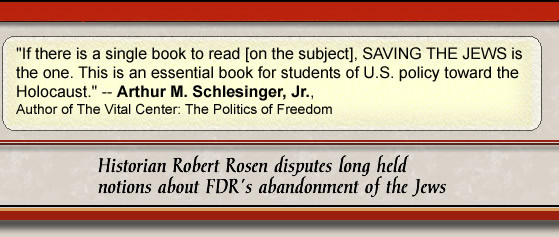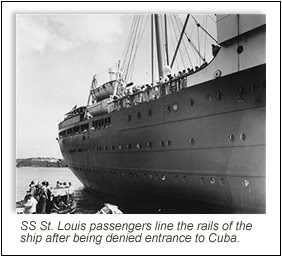




|
Reviews |
|
|
|
|
|
|
Why I Wrote The Book |
|
|
Excerpts |
|
|
Table Of Contents |
|
|
Auschwitz |
|
|
SS St. Louis |
|
|
Timeline |
|
|
A Survivor Speaks Out |
|
|
Carter Center Speech |
|
|
Justice At Nuremberg |
|
|
Purchase |
|
|
Related Links |
History on Book TV
View Video Clip Purchase Video
2006 Roosevelt Reading Festival: Robert Rosen
Saturday, September 16 at 12:15 pm and
Sunday, September 17 at 5:30 am
Six million Jews died in the Holocaust. Since the 1960s, when a post-World War II
generation of historians came of age, President Franklin Delano Roosevelt has increasingly been seen as, at best, standing idly by while this atrocity occurred. But is this an accurate picture? In his new book, SAVING THE JEWS: Franklin D. Roosevelt and the Holocaust (Thunder's Mouth Press, April 25, 2006), Robert N. Rosen argues that, in fact, FDR was one of the few men of his time who understood -- and sought to defeat -- the enormous threat Hitler posed, and that the Roosevelt Administration did all that could reasonably be done, under the circumstances, to save the Jews and other victims of Nazism.
Based on vigorous research, this narrative and interpretive history places FDR's actions in the context of the time period in which they occurred -- an era characterized by The Great Depression, widespread American isolationism, strict immigration legislation, and extensive anti-Semitism. Rosen reveals that, seen in this light, FDR's achievements in battling Nazism and saving Jews were very nearly monumental. "Roosevelt did not abandon the Jews of Europe," he writes. "On the contrary, he led the worldwide coalition against Nazism in a war that took fifty million lives."
SAVING THE JEWS offers extensive evidence of FDR's close ties to Jewish leaders, and his appointment of many Jews to high-level positions, including the Supreme Court. Rosen outlines the numerous attempts FDR made to allow Jewish refugees to enter the United States -- and explains why, at weaker periods of his presidency, FDR simply didn't have the political capital to wage these battles. He also offers a full picture of the overwhelming mood in the country -- the strong desire to remain neutral regarding European affairs and the distrust of anything that smacked of internationalism. And he points to divisions in the American Jewish community, which had not reached a consensus as to the best policy for freeing their European counterparts from Nazi persecution. Rosen takes on each of the chief accusations frequently leveled at Roosevelt with regard to his handling of the Holocaust, and demonstrates why these charges are unfair and unfounded. These include:
 (the majority
of
whom survived the war) to be taken in by other European countries and avoid
being
returned to Germany
(the majority
of
whom survived the war) to be taken in by other European countries and avoid
being
returned to Germany
Judging Roosevelt's actions -- or inactions
-- by the lens of what we now know -- and feel -- about the unprecedented
atrocities committed by Hitler against the Jews is to hold FDR to an
impossible standard, argues Rosen. With extensive documentation, SAVING THE
JEWS demonstrates FDR's prescience in understanding the real
threat Hitler posed, not only to the
Jews, but to democracy in Europe and in the U.S. And Rosen outlines how
Roosevelt's
decisions about saving the Jews necessarily had to be subordinated to his
highest goal --
saving the world from Nazism.
"Hitler's immediate and seemingly attainable goal in Europe was to
murder eleven million
Jews, not six million. Franklin Roosevelt prevented Hitler from achieving
his goal," writes
Rosen. A fascinating and fast-moving read, SAVING
THE JEWS offers a comprehensive
understanding of the Roosevelt Administration's commendable record regarding
the
Holocaust.